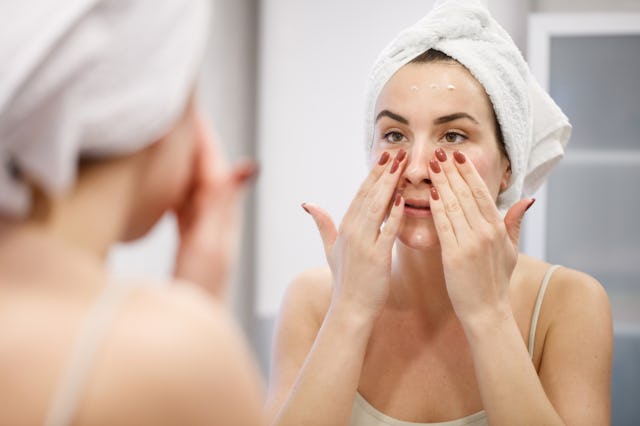Is Eye Cream A Total Scam? Here's What An Esthetician Says
For those of us who’ve lowkey been thinking there really isn’t a difference between face cream and eye cream.

Even as a massive beauty fan, it's hard not to feel overwhelmed sometimes by the number of new "must-have" products launched daily. Where Ms. Maisel only seemed to need to slather on cold cream at night, we now live in a world where Shay Mitchell has a 58-step beauty routine to follow each and every day.
With that in mind, it's no wonder that so many people are looking for a more edited approach to beauty, one that gets the job done with far fewer products. With that mentality in mind, many people on social media started asking the question we've all been quietly wondering for years: What's the deal with eye cream? Face cream and SPF make sense. But why can't those just be used around the eyes to cut out one of the many steps?
To determine whether eye cream is as redundant as it may seem, I spoke with Valerie Aparovich, a cosmetologist-aesthetician, biochemist, and science team lead at cosmetic health app OnSkin, about what eye cream offers that face cream does not.
Why a Face Cream ≠ an Eye Cream
While a face cream might provide some of the hydration that the area around the eye needs, you should consider a few factors before ditching the idea of an eye cream altogether.
"The skin around the eyes is naturally thinner, more delicate, and more sensitive than on the rest of the face," Aparovich explains. "Most eye creams are targeted-formulated with the delicacy of this specific skin area in mind. Usually, they contain higher concentrations of hydrating components, as well as ingredients addressing particular concerns of this skin zone, like caffeine for dark circles or mint derivatives for cooling and puffiness."
This means that, though a face cream can help moisturize the area, it won't necessarily provide the care and attention needed for more targeted issues you may have around the eye area. This can include undereye darkness, wrinkles, puffiness, and sensitivity that come with thinner, more delicate skin. These issues can also be exacerbated if you use a face cream with irritating ingredients. After all, some face creams contain more powerful ingredients that the rest of your skin can easily take, but that may cause redness and adverse effects to the more sensitive eye area.
"Not all creams are created the same. Both eye and face products may come in different variations and formulations," Aparovich says. She shared an example of something like a retinol-based face product that may contain amounts of retinol that are too high to be tolerated around the eye. In this case, it would be recommended to use a specialized retinol-based eye cream with a lower percentage instead.
What to Look for in an Eye Cream
So, when looking for an eye cream, you will want to look for ingredients that are more targeted at treating any concerns you are dealing with around the eye area. According to Aparovich, the most common problems experienced around the eye areas are dryness, sensitivity, dark circles, puffiness, and wrinkles.
To pick the right eye cream for each of these concerns, she shared the specific ingredients you should look for in each:
- For Dryness: Hyaluronic acid and collagen moisturize the skin, and ceramides prevent the skin from water loss and help maintain its hydrolipid barrier.
- For Sensitivity: Vitamin P will help improve blood and oxygen flow in the area, while vitamin C helps ease rosacea and redness. Vitamin K helps improve skin barrier function, and Arnica plant extract helps to activate blood circulation.
- For Dark Circles: Caffeine can help reduce discoloration around the eyes, while vitamin C and niacinamide have brightening properties.
- For Puffiness: Caffeine has anti-puffing effects, and mint helps to stimulate the fluids around the area and improve microcirculation.
- For Wrinkles: Retinol is an active anti-aging agent that helps stimulate collagen and boosts the renewal process (note that you will not want to use retinol while pregnant or breastfeeding). Bakuchiol is a plant-derived, more gentle alternative to retinol. Peptides also help to combat fine lines and wrinkles.
So, while eye cream may not be at the top of your must-do list, there's no denying that it does serve a purpose. The delicate skin around your eyes needs a little extra TLC, and the active ingredients in your face product may be doing more harm than good. When it comes to minimizing your skincare routine, there are absolutely steps to cut out, but this may not be one of them.